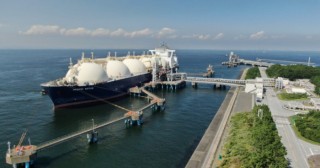Loading
Search
▼ Japan Aims To Boost LNG Trading Across Asia
- Category:Event
Japanese companies are strategically expanding their investments in liquefied natural gas (LNG) markets across Asia, anticipating a surplus in their LNG stocks in the coming years due to declining domestic demand.
This shift is driven by factors such as the restart of nuclear plants and the increasing adoption of renewable energy within Japan, leading to the lowest LNG imports in over a decade, News.Az reports citing Reuters.
As more nuclear plants restart and renewable energy gains momentum, Japan's LNG imports are at their lowest in over a decade, spurring companies to turn to Asia to unload supplies contracted during past market shocks.
Energy flexibility and security concerns ensure that Japan wants to stay a big player in LNG, but it is looking for markets to sell its excess, in line with a government strategy to keep volumes at 100 million tonnes by building gas demand in Asia.
This year, Tokyo Gas announced a study for 1.5-gigawatt LNG-to-power project in Vietnam and bought a stake in an LNG regasification terminal in the Philippines, while trading houses Marubeni and Sojitz launched a 1.8 GW-big LNG-fired power plant in Indonesia.
Led by JERA, Tokyo Gas, Osaka Gas and Kansai Electric Power, Japan is a stakeholder, feedstock provider or participant in studies for more than 30 gas-related projects, data from the Institute for Energy Economic and Financial Analysis (IEEFA) and Reuters shows.
Whether operating or yet to be launched, these are located in Bangladesh, India, Indonesia, Malaysia, Myanmar, the Philippines, Singapore, Taiwan, Thailand, and Vietnam.
Japan stepped up imports of LNG after the Fukushima nuclear disaster of 2011 led to closure of all its nuclear power reactors, and Tokyo has increased participation in LNG projects globally to secure supply.
But the comeback of nuclear power and the roll-out of renewable energy have led resource-scarce Japan to cut LNG imports for its own needs, with shipments falling by 8% last year to the lowest since 2009.
In 2020, the industry ministry adopted a plan to hold LNG handling capacity, including trade, at 100 million tons a year by 2030, a key feature of which was building Asian gas markets.
"There are various pathways towards achieving carbon neutrality or net-zero emissions in Asia," METI said in emailed comments. "Gas and LNG, along with renewables and
energy conservation, can play a role in the pathways."
Japan's shipments, both for domestic use and sent to third countries, were 102 million tons of LNG, in the year that ended in March 2023.
This shift is driven by factors such as the restart of nuclear plants and the increasing adoption of renewable energy within Japan, leading to the lowest LNG imports in over a decade, News.Az reports citing Reuters.
As more nuclear plants restart and renewable energy gains momentum, Japan's LNG imports are at their lowest in over a decade, spurring companies to turn to Asia to unload supplies contracted during past market shocks.
Energy flexibility and security concerns ensure that Japan wants to stay a big player in LNG, but it is looking for markets to sell its excess, in line with a government strategy to keep volumes at 100 million tonnes by building gas demand in Asia.
This year, Tokyo Gas announced a study for 1.5-gigawatt LNG-to-power project in Vietnam and bought a stake in an LNG regasification terminal in the Philippines, while trading houses Marubeni and Sojitz launched a 1.8 GW-big LNG-fired power plant in Indonesia.
Led by JERA, Tokyo Gas, Osaka Gas and Kansai Electric Power, Japan is a stakeholder, feedstock provider or participant in studies for more than 30 gas-related projects, data from the Institute for Energy Economic and Financial Analysis (IEEFA) and Reuters shows.
Whether operating or yet to be launched, these are located in Bangladesh, India, Indonesia, Malaysia, Myanmar, the Philippines, Singapore, Taiwan, Thailand, and Vietnam.
Japan stepped up imports of LNG after the Fukushima nuclear disaster of 2011 led to closure of all its nuclear power reactors, and Tokyo has increased participation in LNG projects globally to secure supply.
But the comeback of nuclear power and the roll-out of renewable energy have led resource-scarce Japan to cut LNG imports for its own needs, with shipments falling by 8% last year to the lowest since 2009.
In 2020, the industry ministry adopted a plan to hold LNG handling capacity, including trade, at 100 million tons a year by 2030, a key feature of which was building Asian gas markets.
"There are various pathways towards achieving carbon neutrality or net-zero emissions in Asia," METI said in emailed comments. "Gas and LNG, along with renewables and
energy conservation, can play a role in the pathways."
Japan's shipments, both for domestic use and sent to third countries, were 102 million tons of LNG, in the year that ended in March 2023.
- July 12, 2024
- Comment (0)
- Trackback(0)


